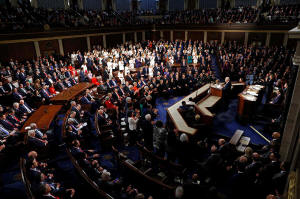US congressional funding fights take toll on housing aid programs
 Send a link to a friend
Send a link to a friend
 [March 18, 2024]
By Richard Cowan [March 18, 2024]
By Richard Cowan
WASHINGTON (Reuters) - Democrats in the U.S. Congress fended off some of
the deepest cuts to housing and other social safety net programs sought
by Republicans, but low-income Americans will nonetheless feel the brunt
of reductions that were included in a new law.
Washington's efforts to address the availability of affordable dwellings
for low-income families and rid aging structures of dangerous lead-paint
contamination suffered funding setbacks in legislation enacted earlier
this month as part of a wide-ranging government spending measure.
As soon as Sunday, congressional leaders could unveil a deal on a second
batch of legislation that may include funding for important health,
labor and education programs. Lawmakers face a Friday deadline to pass
these measures or risk a partial government shutdown.
The bills would determine funding levels for an array of social
programs, including teachers serving low-income students, reducing
mortality for poor pregnant women, job training for disadvantaged youth
and HIV prevention.
The funding reductions in the appropriations bills already enacted into
law come as housing advocates have warned that the needs of low-income
families were not being met, especially following the COVID-19 pandemic
and rising housing prices.

Almost six months into the fiscal year that began on Oct. 1,
Republicans, who control the House of Representatives, and Democrats,
who hold a Senate majority and the White House, are still arguing about
federal spending priorities amid a national debt of $34.5 trillion that
is rising at a dizzying rate.
"Today, it costs in some places 40% more than it did before the pandemic
to produce affordable housing," said Kevin Nowak, head of the nonprofit
CHN Housing Partners, which develops affordable housing in Cleveland,
Detroit and Pittsburgh, and is a lender for those who are left out of
traditional mortgage markets.
"In Cleveland, one of the highest concentrations of poverty in the
country, it will be particularly harmful," Nowak added.
He was referring to the $250 million cut to the Housing and Urban
Development Department's "HOME" program. House Republicans had sought a
$1 billion reduction to the program that helps state and local
governments produce affordable rental and owner-occupied housing.
About three-quarters of likely eligible households in the United States
do not receive rental assistance, according to Sonya Acosta, a housing
specialist at the left-leaning Center on Budget and Policy Priorities.
[to top of second column]
|

U.S. President Joe Biden delivers the State of the Union address to
a joint session of Congress in the House Chamber of the U.S. Capitol
in Washington, U.S., March 7, 2024. REUTERS/Evelyn Hockstein/File
Photo

Part of the reason is because applicants spend an average of nearly
2-1/2 years on wait lists because of the high demand for housing
"vouchers" and limited government funding, Acosta said, citing U.S.
Department of Housing and Urban Development data.
Cleveland's population of 361,607 is 46.6% Black and 38% white with
31.2% living in poverty, according to Census Bureau data.
U.S. House Democrats estimate this new HOME budget will support
around 21,000 new or rehabilitated units nationwide, an estimated
4,185 fewer than last year.
The two political parties managed to cooperate this year on a
federal housing voucher program providing around 2.3 million
low-income families with rental assistance in the private market.
The $32.4 billion appropriated, $2.1 billion above last year, aims
to keep pace with inflation and help very low-income veterans and
youth aging out of foster care, according to officials.
"We stabilized and protected housing assistance for nearly 5 million
low-income individuals and families," said Representative Rosa
DeLauro, the senior Democrat on the House Appropriations Committee.
"We didn't get everything that we wanted but we got most of it."
Republicans meantime won funding cuts to the Environmental
Protection Agency, FBI and other agencies, although not as deep as
originally sought by the House.
House Appropriations Committee Republicans said the newly enacted
package of bills "maintains housing assistance for vulnerable
Americans," while achieving the first overall spending reductions in
"wasteful" programs in nearly a decade.
Meanwhile, Republicans won a $130 million cut to efforts helping
low-income families reduce or eradicate dangerous levels of lead
paint in aging homes. That, however, was far below the more than
$500 million in savings House Republicans originally had targeted.
(Reporting by Richard Cowan in Washington; Editing by Matthew Lewis)
[© 2024 Thomson Reuters. All rights reserved.]This material
may not be published, broadcast, rewritten or redistributed.
Thompson Reuters is solely responsible for this content.
 |